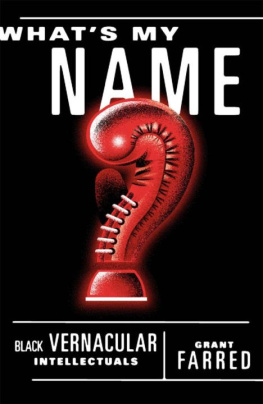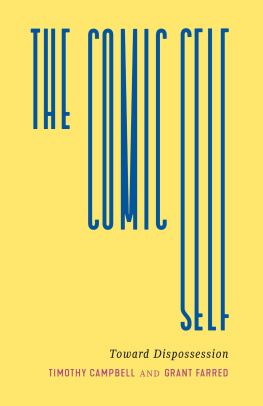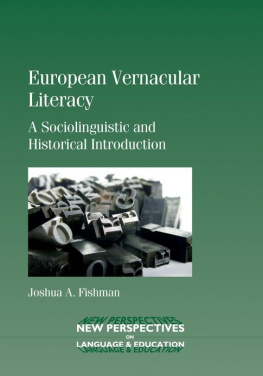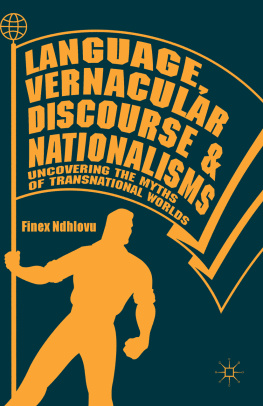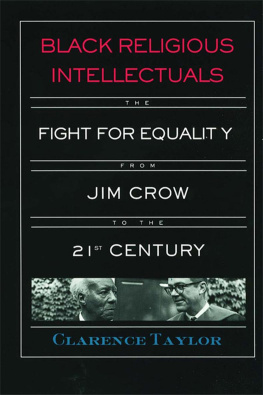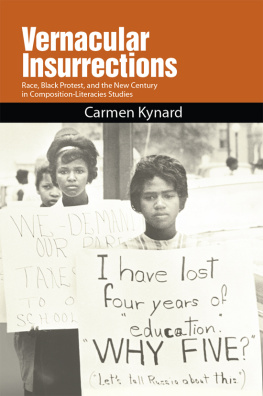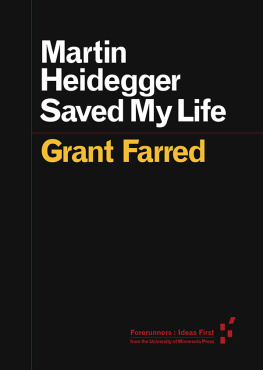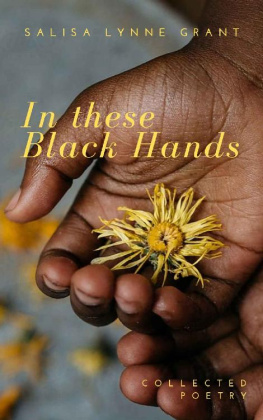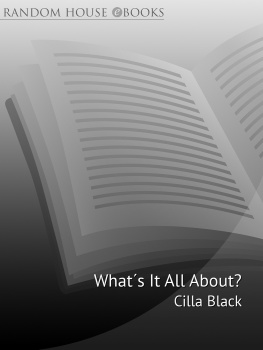Grant Farred - Whats My Name?: Black Vernacular Intellectuals
Here you can read online Grant Farred - Whats My Name?: Black Vernacular Intellectuals full text of the book (entire story) in english for free. Download pdf and epub, get meaning, cover and reviews about this ebook. year: 2010, genre: Politics. Description of the work, (preface) as well as reviews are available. Best literature library LitArk.com created for fans of good reading and offers a wide selection of genres:
Romance novel
Science fiction
Adventure
Detective
Science
History
Home and family
Prose
Art
Politics
Computer
Non-fiction
Religion
Business
Children
Humor
Choose a favorite category and find really read worthwhile books. Enjoy immersion in the world of imagination, feel the emotions of the characters or learn something new for yourself, make an fascinating discovery.
- Book:Whats My Name?: Black Vernacular Intellectuals
- Author:
- Genre:
- Year:2010
- Rating:3 / 5
- Favourites:Add to favourites
- Your mark:
- 60
- 1
- 2
- 3
- 4
- 5
Whats My Name?: Black Vernacular Intellectuals: summary, description and annotation
We offer to read an annotation, description, summary or preface (depends on what the author of the book "Whats My Name?: Black Vernacular Intellectuals" wrote himself). If you haven't found the necessary information about the book — write in the comments, we will try to find it.
Whats My Name?: Black Vernacular Intellectuals — read online for free the complete book (whole text) full work
Below is the text of the book, divided by pages. System saving the place of the last page read, allows you to conveniently read the book "Whats My Name?: Black Vernacular Intellectuals" online for free, without having to search again every time where you left off. Put a bookmark, and you can go to the page where you finished reading at any time.
Font size:
Interval:
Bookmark:

Grant Farred

To my daughter, Andrea Farred: with love, Bug, for you, always.
ix
This project began a while ago, in a very different form, in a restaurant that no longer exists. What has endured throughout the process is a series of conversations with Andrew Ross, a rare intellectual and friend. What's My Name? could not have been conceived without Andrew's continued support (in this and so many other ventures), his vision, and his generosity. He was astute on C. L. R. James, gave me keen insight into Stuart Hall, and brought no small amount of joie de vivre to the Muhammad Ali and Bob Marley chapters. He cajoled and, most important, challenged me to think assiduously about my category of the vernacular intellectual. Through it all he never stopped believing in the book, and his advice was sage, sane, and always inflected with his most endearing quality: a sense of fun and perspective about the academy and the work we do in and outside of it. I owe Andrew a great many debts.
My editors at the University of Minnesota Press, William Murphy and Richard Morrison, lent their different strengths and personalities to the project. William brought a focus, seriousness, and intensity that I deeply appreciate. Richard pushed and probed, always making encouraging noises, always insisting not so subtly on deadlines, always pushing me to think about the issue one more time. I seldom met the deadlines but the sound of his voice seemed most resonant when I was pursuing other writings. He kept me on track. My thanks to William and Richard and the Press for their faith in What's My Name?.
I am grateful to Stuart Hall for answering my queries with his inimitable generosity. In encounters from London to Kingston, he listened to me good naturedly about the project though I have little doubt that he would, typical of his modesty, rather not have discussed himself. Like many cultural studies and postcolonial theory scholars, I have benefited immensely from the vast Hall corpus, conversations with him, and, most important, the intellectual and political example that Stuart sets for all of us. So much work in both these fields would be unimaginable without the foundation he provided and the ongoing contributions he makes to this and several disciplines.
To my friends: Ian Balfour, for his wry advice, his impeccable taste in music, and his love of the popular, the profane, and the sublime. Tess Chakkalakal, for her persistent intelligence, her unquenchable interest in sport, and her humor. Wahneema Lubiano, for being a remarkable teacher and colleague and for a mind that never fails to amaze. Jan Radway, a serious scholar whose work in cultural studies offers an example to so many in the field. Thanks to Rebecca Ohm, librarian with a smile, and Tammi Brooks, who guided me through the editing. To Prabha Jerrybandan, who provided humor in the final stages. To all these folks, my thanks for reading various versions of the manuscript, offering incisive comments and suggestions, and bibliographic help. The final product would have been poorer without their input.
And finally, to my daughter Andrea Farred: for your irascibility, your capacity for fun and ringing laughter, your remarkable courage and fortitude, your immersion in popular culture, and the joy you bring me in every exchange, this book is dedicated to you. With love.
Durham, July 2003
Who knows but that on the lower frequencies, I speak for you?
-Ralph Ellison, Invisible Mann
Vernacularize. Explore and explicate the links between the popular and the political. Never underestimate the capacity of the popular to elucidate the ideological, to animate the political, never overlook the vernacular as a means of producing a subaltern or postcolonial voice that resists, subverts, disrupts, reconfigures, or impacts the dominant discourse. For disempowered constituencies, resistance against the domination is extremely difficult without a vernacular component. Challenging or overcoming subjugation frequently depends on those expressions of disenfranchised life that articulate ideological oppositionality and the pleasures that are contained within-and extraneous to-acts of political resistance. The political is not always pleasurable; but the pleasurable, within the vernacular, is always potentially political. Within the terms of the vernacular, no minority or anticolonial struggle can be sustained if it does not contain in it a cultural element; an element, moreover, that has popular purchase. In the vernacular conception of politics, popular culture constitutes a singular practice. It represents that mode in which the political and the popular conjoin identificatory pleasure with ideological resistance.
In order for a black or marginalized intellectual (more so than for other figures) to be politically efficacious, the historical injunction is overdetermined: vernacularity is an absolute prerequisite. From W. F. B. DuBois's The Souls of Black Folk, a study of black life in the Reconstruction South, to Stuart Hall's writing on cultural studies, from C. L. R. James's treatise on cricket (Beyond a Boundary) to Angela Davis's theorization of the black woman's condition, black public thinkers of the twentieth century have been at their most incisive and effective when they adopt vernacularity as the dominant intellectual mode.
The vernacular, I argue in What s My Name?, is a distinct definition of-and a way of being-the intellectual. Deeply grounded in the ways in which the cultural shapes and reshapes the political impact of four black thinkers, Cyril Lionel Robert (C. L. R.) James, Stuart Hall, Muhammad All, and Bob Marley, this study reconsiders the post- and anticolonial figure as an intellectual. In setting All and Marley alongside James and Hall, I offer a conceptualization beyond the existing categorizations of the intellectual. This book rethinks the most fundamental tenet of what is accepted as "intellectual" by asking, Who is an intellectual? And, why? This study is an exploration of how these four different figures, from different parts and classes of the Caribbean and the United States, are understood as intellectuals; it refigures the public interventions they made (and are all, in their various ways, still making) and explicates how their various articulations, their different engagements with the dominant culture, register as intellectual labor.
In conceptualizing the vernacular intellectual, I draw on and develop, and then distinguish the category from, Antonio Gramsci's organic or traditional model. The Italian Marxist's construction of the intellectual (which turns on his famously egalitarian definition, "All men are intellectuals, one could therefore say: but not all men have in society the function of intellectuals") provides the groundwork for the vernacular intellectual.2 Gramsci's democratization of the role of public thinkers (gendered as it is)-"All men are intellectuals"-provides the basis for conceiving of the African-American boxer, the Trinidadian-born Marxist, the Jamaican-born New Lefter, and the Jamaican reggae star as political and cultural figures who perform, in their different societies, distinct "functions" as "intellectuals." Gramsci's definition allows for (re)configuring a paradigm in which the articulations of a Marley (the various critiques of race, class, and ideology contained in his lyrics) and a James (using cricket to inveigh against colonialism, racism, and economic exploitation) can both be understood as culturally based intellectual interventions; following Gramsci, it is possible to think of All and James simultaneously as antiracist black intellectuals, to imagine Hall and Marley as postcolonial figures who have as much resonance (more, until recently, in Hall's case) in the metropolis as they do in their peripheral Caribbean.'
Font size:
Interval:
Bookmark:
Similar books «Whats My Name?: Black Vernacular Intellectuals»
Look at similar books to Whats My Name?: Black Vernacular Intellectuals. We have selected literature similar in name and meaning in the hope of providing readers with more options to find new, interesting, not yet read works.
Discussion, reviews of the book Whats My Name?: Black Vernacular Intellectuals and just readers' own opinions. Leave your comments, write what you think about the work, its meaning or the main characters. Specify what exactly you liked and what you didn't like, and why you think so.

